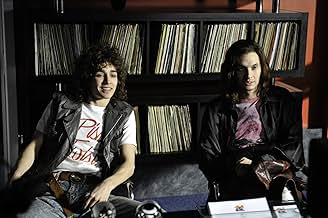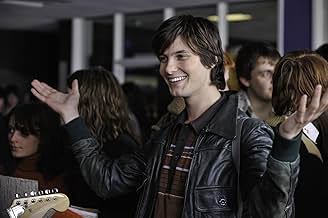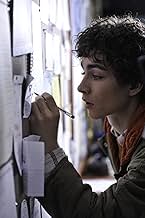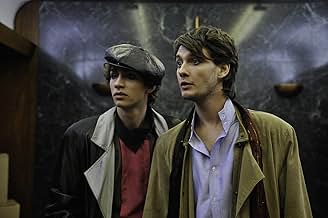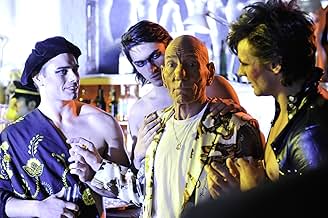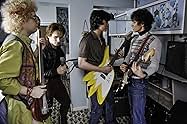IMDb-BEWERTUNG
6,3/10
6807
IHRE BEWERTUNG
Füge eine Handlung in deiner Sprache hinzuTwo brothers attempt to become global rock stars but can only look on as old school friends U2 become the biggest band in the world.Two brothers attempt to become global rock stars but can only look on as old school friends U2 become the biggest band in the world.Two brothers attempt to become global rock stars but can only look on as old school friends U2 become the biggest band in the world.
Seán Duggan
- Liam
- (as Sean Duggan)
Empfohlene Bewertungen
I really enjoyed this movie. I have to admit, I initially had NO interest in the story, and only set out to see it to check out Ben Barnes' latest project. But within 10 minutes I forgot about watching "the lovely Mr. Barnes" (which he is not, in this movie) and was genuinely captivated by and became engaged in the story, the characters and the humor. I'd seen clips and responded with a yawn; thought the comedy portrayed in them was obvious and heavy-handed. But the trailer doesn't do it justice. The laughs were real and unexpected and the dialogue quick, natural and enjoyable. All of the supporting characters were excellent. Robert Sheehan, whom I'd never seen in anything prior, did a good job and Barnes disappears into and owns his character. All in all a fun watch, I'd recommend it.
I think the story this movie tells actually had some legs on it. It was interesting, there was depth and insight in it, but the director chose exactly the wrong tone for telling it and the result is an addition to the list of failures associated with the central figure. The tone is a mediocre wanting-to-please-everyone Grange Hill TV vibe with none of the serious themes coming through well because everything is played for light, obvious, almost slapstick laughs; it's delivery so rooted in dated TV stylings that you wonder what the production team were thinking. Sure the story is from the 80's but cinema has grown leaps and bounds since then. Look to the documentary Anvil for how something like this could better be handled. Some of the cast were well chosen but their delivery was well off, in keeping with the bad choice of feel. I wish this film was better, and another production team may well milk it for the good it has in its story, if it gets another shot at its 15 mins of fame. On a side note original videos of the real band shook up show them to be something quite terrible, so that kind of ruins everything.
I can see how some people may get annoyed at the protagonist of this story. "Killing Bono" is the story of a chronic loser, and from the outset, he makes every bad choice possible, repeats his bad choices, blows just about every golden opportunity to redeem himself. And all the while he cockily convinces himself that he is the last great idealist on the planet. Who would want to sit through 2 hours of this??
Answer: YOU.
Maybe it's Ben Barnes' charming portrayal of the loser (a bit like John Ritter's charming loser character Jack Tripper on "Three's Company"), maybe it's the wonderfully acidic script, maybe it's the parade of lovably bizarre characters, or maybe it's the suspense of wanting to know if he actually does kill Bono, as the title & opening flash-forward scene tease us. Whatever it is, something about this film will keep you interested & entertained until the very second the end credits roll.
Loosely, very loosely based on the memoirs of Bono's 70s school chum and rival rockstar Neil McCormick, this film depicts some true events such as the anemic rise of Neil's 80s pop band "Shook Up!" (they weren't half bad, check out their videos on youtube) and some not-so-true events that really spice things up in the third act. But since this is a comedy, the fictionalizations are strangely believable if not central to the point of the movie.
"This is not a true story. It is crucial to say that," says director Nick Hamm in the DVD bonus featurette. "You can be real to the story you're telling, but your story doesn't have to be real."
The real Neil McCormick, when asked about the fictional aspects, sheepishly approved: "We all fictionalise ourselves ... I created a version of myself to suit my book ... Now, someone has created an alternative version. As a deluded, fame-obsessed young man, of course, I never doubted that one day someone would make a film of my life. It just never occurred to me it would be a comedy."
That it is. A brilliant & entertaining comedy with a compelling theme driving it. Not many comedies have been able to portray the story of a loser in a fun, vibrant way. But if you're familiar with the obscure gems "Buffalo 66", the documentary "Anvil! The Story of Anvil" or the Aussie rocker "Garage Days", you'll have an idea of the treat you have in store here.
A final note about the music: I think it features only one U2 song ("Still Haven't Found What I'm Looking For"), but there are some atmospheric bits that sound hauntingly like U2. There's one song by Neil's band Shook Up! entitled "Stop the World", and most of the other songs seem to be new compositions (or new versions) that actually feature Ben Barnes singing. U2 fans may be disappointed because this is not a movie about U2, although it revolves closely around them. In that respect it's a lot like another great comedy "Grand Theft Parsons" about famed singer Gram Parsons' good friend who decides to steal Gram's body after his death.
"Killing Bono" is a creatively-told fiction that flirts with truth but ultimately takes us in the opposite direction. Hey, this formula worked in "Amadeus" (Mozart), "Immortal Beloved" (Beethoven) and "Impromptu" (Chopin). Sure, why not Bono?
Answer: YOU.
Maybe it's Ben Barnes' charming portrayal of the loser (a bit like John Ritter's charming loser character Jack Tripper on "Three's Company"), maybe it's the wonderfully acidic script, maybe it's the parade of lovably bizarre characters, or maybe it's the suspense of wanting to know if he actually does kill Bono, as the title & opening flash-forward scene tease us. Whatever it is, something about this film will keep you interested & entertained until the very second the end credits roll.
Loosely, very loosely based on the memoirs of Bono's 70s school chum and rival rockstar Neil McCormick, this film depicts some true events such as the anemic rise of Neil's 80s pop band "Shook Up!" (they weren't half bad, check out their videos on youtube) and some not-so-true events that really spice things up in the third act. But since this is a comedy, the fictionalizations are strangely believable if not central to the point of the movie.
"This is not a true story. It is crucial to say that," says director Nick Hamm in the DVD bonus featurette. "You can be real to the story you're telling, but your story doesn't have to be real."
The real Neil McCormick, when asked about the fictional aspects, sheepishly approved: "We all fictionalise ourselves ... I created a version of myself to suit my book ... Now, someone has created an alternative version. As a deluded, fame-obsessed young man, of course, I never doubted that one day someone would make a film of my life. It just never occurred to me it would be a comedy."
That it is. A brilliant & entertaining comedy with a compelling theme driving it. Not many comedies have been able to portray the story of a loser in a fun, vibrant way. But if you're familiar with the obscure gems "Buffalo 66", the documentary "Anvil! The Story of Anvil" or the Aussie rocker "Garage Days", you'll have an idea of the treat you have in store here.
A final note about the music: I think it features only one U2 song ("Still Haven't Found What I'm Looking For"), but there are some atmospheric bits that sound hauntingly like U2. There's one song by Neil's band Shook Up! entitled "Stop the World", and most of the other songs seem to be new compositions (or new versions) that actually feature Ben Barnes singing. U2 fans may be disappointed because this is not a movie about U2, although it revolves closely around them. In that respect it's a lot like another great comedy "Grand Theft Parsons" about famed singer Gram Parsons' good friend who decides to steal Gram's body after his death.
"Killing Bono" is a creatively-told fiction that flirts with truth but ultimately takes us in the opposite direction. Hey, this formula worked in "Amadeus" (Mozart), "Immortal Beloved" (Beethoven) and "Impromptu" (Chopin). Sure, why not Bono?
To truly appreciate this film you'll either have to be 40 something plus or be heavily involved in your own peer group's music scene. The League of Gentleman have a failed musician character that they play for the pathos type of comedy. Here, a real 'failed' musician finds comedy in rewriting his own aborted attempt at snatching fame and fortune in the fickle music industry. It's a very affectionate account - skating gently over the less pleasant aspects of the industry. Robert Sheehan is a dream as Ivan - oooh yes you could really see him in the U2 line up - something brother Neil prevented from happening. I honestly was transported back to the 1980's and dodgy music venues and half baked bands performing as if their lives depended on it. Fabulous. Not everyone's cup of tea though. Pure nostalgia for me - but oh I do wish they'd managed to sneak in a bit more of actual U2 music.
A few years ago there was an achingly trendy 'electro rock' band called Bono Must Die. It was sued out of existence by Bono himself who clearly didn't like the idea of young, hip people swinging their pants to tunes built on Bono-hatred. Now there's a new film out called Killing Bono, yet far from troubling the normally so sensitive singer, it has received his backing. It isn't hard to see why. It's like a creation myth for U2, depicting Bono as a long-suffering saint and his band as a punkish, rebel outfit rather than the Po-faced promoters of 'world music' they really were.
The film is based on rock critic Neil McCormick's book, I Was Bono's Doppelgänger. It tells the true-ish story of Dublin-born Neil and his brother Ivan trying to make it in pop and/or rock while continually being overshadowed by their former schoolfriends Paul Hewson and Dave Evans – otherwise known as Bono and The Edge, whose band The Hype later becomes U2 and conquers the world, while Neil and Ivan scrape by in a dingy flat in London where their numerous record company rejection letters are pinned to the wall in the shape of the word 'WANKERS'.
The trouble is that in turning U2 into the barometer by which he measures and gets miserable about his own rubbishness, McCormick's book and now celluloid life story make Bono a saintly, inscrutably good, otherworldly figure. Bono (Martin McCann) floats through the movie in a Christ-like fashion, always impeccably turned out, voice calm, never saying words like 'bollox' or 'shite' as his schoolmates and the McCormicks do. He does, however, eat chips at one point, which is a kind of shocking image.
It is entirely feasible, of course, that Bono really was like this: aloof, pure, pompous. That would not come as a surprise to anyone who has seen footage of Bono performing in the Eighties, with his big hair, high heels, and breathy, strangely American-accented mini-speeches about uprisings in Soweto (good) or uprisings in Northern Ireland (bad). Yet in investing Bono with an ethereal quality, in making him the yin to McCormick's yang, the movie comes across less like a rock biopic than as a conservative morality tale stuffed with righteous seers and wayward scallywags. Bono effectively saves the McCormick brothers, with a speech in the back of a limousine about brotherly love, in a not dissimilar fashion to the way Christ rescued James and John from a life of fishery.
The mythologising extends to the way U2's music is presented. They're depicted as the heirs to punk, bashing out Iggy Pop songs in a garage before going on to conquer and colonise a bland pop landscape with heartfelt music. In truth, far from being the punks of the Eighties, U2 were the equivalent of those Seventies Po-faced prog rock bands that punk eventually swept aside. U2's own comeuppance came towards the end of the Eighties when, after a decade of thrilling ageing rock critics and Americans but boring the rest of us rigid with their sweeping and serious guitar songs, they were elbowed aside by the rebirth of pop hedonism: rave, acid, baggy, whose adherents didn't go to gigs to learn about Nelson Mandela but to get smashed.
U2's out-of-touchness was brilliantly illustrated by their release in 1988 of the film and album Rattle and Hum, their most worthy dose of blackish, bluesy, Elvisy Americana to date, at a time when the kidz were knocking back Es and dancing like mental patients. 'Bombastic and misguided', said one critic of Rattle and Hum. 'Pretentious', said the rest. And of course U2 only made things worse when they tried to recover by releasing the electronic dance-inspired Achtung, Baby! in 1991. It was as if Jethro Tull had tried to play 'Pretty Vacant'. Just as the punks cheered upon hearing of the death of the fat, bloated Elvis in 1977, so some young 'electro rockers' today wish for the death of Bono.
It really is only a handful of serious rock critics who still treat U2 seriously, fantasising that they are 'real' where most others are fake. As a result, Killing Bono, the life and times of a rock critic in the making, ends up being deeply conservative. Part On The Buses, part Rattle and Hum, it combines slapstick humour with Bono sanctification to tell a pretty warped story about both U2 and the Eighties.
The film is based on rock critic Neil McCormick's book, I Was Bono's Doppelgänger. It tells the true-ish story of Dublin-born Neil and his brother Ivan trying to make it in pop and/or rock while continually being overshadowed by their former schoolfriends Paul Hewson and Dave Evans – otherwise known as Bono and The Edge, whose band The Hype later becomes U2 and conquers the world, while Neil and Ivan scrape by in a dingy flat in London where their numerous record company rejection letters are pinned to the wall in the shape of the word 'WANKERS'.
The trouble is that in turning U2 into the barometer by which he measures and gets miserable about his own rubbishness, McCormick's book and now celluloid life story make Bono a saintly, inscrutably good, otherworldly figure. Bono (Martin McCann) floats through the movie in a Christ-like fashion, always impeccably turned out, voice calm, never saying words like 'bollox' or 'shite' as his schoolmates and the McCormicks do. He does, however, eat chips at one point, which is a kind of shocking image.
It is entirely feasible, of course, that Bono really was like this: aloof, pure, pompous. That would not come as a surprise to anyone who has seen footage of Bono performing in the Eighties, with his big hair, high heels, and breathy, strangely American-accented mini-speeches about uprisings in Soweto (good) or uprisings in Northern Ireland (bad). Yet in investing Bono with an ethereal quality, in making him the yin to McCormick's yang, the movie comes across less like a rock biopic than as a conservative morality tale stuffed with righteous seers and wayward scallywags. Bono effectively saves the McCormick brothers, with a speech in the back of a limousine about brotherly love, in a not dissimilar fashion to the way Christ rescued James and John from a life of fishery.
The mythologising extends to the way U2's music is presented. They're depicted as the heirs to punk, bashing out Iggy Pop songs in a garage before going on to conquer and colonise a bland pop landscape with heartfelt music. In truth, far from being the punks of the Eighties, U2 were the equivalent of those Seventies Po-faced prog rock bands that punk eventually swept aside. U2's own comeuppance came towards the end of the Eighties when, after a decade of thrilling ageing rock critics and Americans but boring the rest of us rigid with their sweeping and serious guitar songs, they were elbowed aside by the rebirth of pop hedonism: rave, acid, baggy, whose adherents didn't go to gigs to learn about Nelson Mandela but to get smashed.
U2's out-of-touchness was brilliantly illustrated by their release in 1988 of the film and album Rattle and Hum, their most worthy dose of blackish, bluesy, Elvisy Americana to date, at a time when the kidz were knocking back Es and dancing like mental patients. 'Bombastic and misguided', said one critic of Rattle and Hum. 'Pretentious', said the rest. And of course U2 only made things worse when they tried to recover by releasing the electronic dance-inspired Achtung, Baby! in 1991. It was as if Jethro Tull had tried to play 'Pretty Vacant'. Just as the punks cheered upon hearing of the death of the fat, bloated Elvis in 1977, so some young 'electro rockers' today wish for the death of Bono.
It really is only a handful of serious rock critics who still treat U2 seriously, fantasising that they are 'real' where most others are fake. As a result, Killing Bono, the life and times of a rock critic in the making, ends up being deeply conservative. Part On The Buses, part Rattle and Hum, it combines slapstick humour with Bono sanctification to tell a pretty warped story about both U2 and the Eighties.
Wusstest du schon
- WissenswertesThe real brothers Ivan and Neil McCormick made a cameo in this movie. They are the folks watching one of the first gigs in an empty bar.
- PatzerAt the bands first practice (in 1976) Ivan McCormick suggests playing a song by Dire Straits. Dire Straits recorded their first album in 1978, so none of them would have known any songs by Dire Straits, let alone have even heard of them.
- Zitate
Ivan McCormick: You made the worst decision of my life!
- VerbindungenFeatured in Ebert Presents: At the Movies: Folge #2.16 (2011)
Top-Auswahl
Melde dich zum Bewerten an und greife auf die Watchlist für personalisierte Empfehlungen zu.
- How long is Killing Bono?Powered by Alexa
Details
- Erscheinungsdatum
- Herkunftsländer
- Offizieller Standort
- Sprache
- Auch bekannt als
- Hạ Gục Bono
- Drehorte
- Produktionsfirmen
- Weitere beteiligte Unternehmen bei IMDbPro anzeigen
Box Office
- Weltweiter Bruttoertrag
- 717.798 $
- Laufzeit
- 1 Std. 54 Min.(114 min)
- Farbe
- Sound-Mix
- Seitenverhältnis
- 2.35 : 1
Zu dieser Seite beitragen
Bearbeitung vorschlagen oder fehlenden Inhalt hinzufügen







